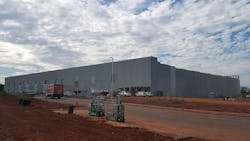ASHBURN, Va. – There’s a new colossus rising along Loudoun County Parkway. The massive data center is the first building on Digital Realty’s new expansion campus in Northern Virginia’s “Data Center Alley.” The two-story structure will support 36 megawatts of IT capacity, making it the largest data center the company has ever built.
The project, known as Building L, is the first of eight data centers planned for Digital Loudoun III, a 238-acre campus spanning some of the most connected real estate in the country. The company’s site plan envisions 3.7 million square feet of data center space, supporting 324 megawatts of IT capacity.
The immense new campus reflects the ambitions at Digital Realty, which reached new heights yesterday as the company completed its $7.8 billion acquisition of rival DuPont Fabros Technology (DFT). The deal combines the two largest players in the market for wholesale (“plug and play”) data center space.
Digital Realty is both buying and building as it establishes a dominant position in the data center market. Its acquisitions of Telx and DFT have created a company of enormous size and breadth. The new Digital Realty operates 157 properties in 33 markets around the globe, with more than 27 million square feet of data center real estate. Its product offerings span everything from colocation cabinets to entire hyperscale data centers.
Bill Stein, the CEO of Digital Realty, said the DFT deal is “the biggest step we have taken to date in accelerating our commitment to provide the most comprehensive set of data center solutions and expertise in the market.”
In Ashburn, the Big Get Bigger
Nowhere is the collective impact of Digital Realty’s scale more visible than here in Ashburn, a town in Loudoun County which sits atop the world’s densest intersection of fiber networks, making it an ideal location to store and distribute data. It is the focal point of activity in Northern Virginia, the largest and fastest-growing market for data center space.
Ashburn’s data centers host tens of thousands of servers for marquee technology companies like Amazon Web Services, Facebook, Microsoft, Apple and Google. These companies have a huge appetite for data center space, sparking an unprecedented construction boom in Ashburn and the surrounding towns.
Digital Realty now operates two massive campuses in Ashburn. There’s the original Digital Ashburn campus, which houses 10 huge data centers near the Dulles Greenway. It also now owns the Ashburn Corporate Center (ACC) developed by DuPont Fabros, which features seven data centers housing 190 megawatts of IT capacity.
The company’s Ashburn portfolio will soon be getting even bigger, thanks to its development pipeline.
Even before the DFT deal, Digital Realty was laying the groundwork for future expansion in Ashburn. It’s been building here since 2007, gradually adding to its Digital Ashburn campus. In November 2015 the company acquired 125 acres of land less than a mile away, bordering Loudoun County Parkway and Waxpool Road. In 2016 it bought adjacent properties, adding 112 acres.
New Design Delivers More Scale
Jonathan Litvany knows the neighborhood well. Litvany, the Global Sales Director for Digital Realty, worked across the street at UUNet during the early days of the Internet boom in the late 1990s. In those days, he noted, 300 kilowatts of IT seemed like a lot of gear. That’s now the minimum requirement for Digital Realty’s wholesale operation (with smaller customers working with the Telx colocation business).
At the other end of the spectrum is Building L, which uses an updated design pioneered at 1210 Integrity Drive, the newest building on the Digital Dallas campus in Richardson, Texas. It’s a 36-megawatt, 464,000 square foot property featuring large data halls and equipment galleys that shift the power and cooling units outside the customer space.
Digital Realty has been building two-story facilities in Ashburn for several years, reflecting a trend toward multi-story data centers in markets where it’s becoming more difficult to find development sites for new construction projects.
Commissioning work is underway at Digital Realty’s Building L at the Digital Loudoun III campus, which features 6 megawatt data halls. (Photo: Rich Miller)
Building L includes six data halls, each of which support 6 megawatts of capacity, and can range in size from 36,000 to 45,000 square feet. That’s a change from the 1.2 MW data hall that for many years served as the standard form factor for Digital Realty’s Turn-Key Data Center wholesale product. The super-sized room provides a large footprint for hyperscale customers looking to add capacity quickly. If no large deals materialize, it can be easily partitioned into smaller rooms.
The Acre Pod
“The computer rooms are getting bigger,” said Allen Tucker, Managing Director at Jones Lang LaSalle. who discussed the trend Wednesday at the CAPRE Data Center Summit in Ashburn. Just a few years ago, the average wholesale data hall was 8,000 to 10,000 square feet, Tucker said, while now they range as large as 60,000 square feet.
Tucker refers to Digital Realty’s new data hall spec as “acre pods” (an acre is 43,560 square feet). It’s a sign of the hyperscale era that individual data halls can now be measured in acreage.
The first data hall in Building L is partially leased, and scheduled to be delivered on October 1. A second data hall is scheduled to be completed in December.
Here’s the kicker: Litvany says the new building is just the first phase of Building L. Two future phases are planned, which will eventually create an 84-megawatt data center building.
Building M will be adjacent to Building L, while buildings N and P will be further up Loudoun County Parkway. Digital Realty has expanded the campus plan to include four buildings on the far side of its property, lining Broderick Drive and Prentice Drive.
And then there’s the DuPont Fabros construction pipeline.
Construction on DuPont Fabros Technology’s ACC10, which will bring 15 megawatts of IT capacity online early next year. (Photo: Rich Miller)
From the parking lot of Building L, you can look to the northwest and see the concrete framework rising for another huge data center. This is ACC 10, the newest construction project for DuPont Fabros Technology. The first phase of the project is scheduled to be completed in the second quarter of 2018, adding 15 megawatts of capacity to the portfolio of the new Digital Realty. Phase II will follow, adding another 12 megawatts.
DFT has two other parcels of land for development, ACC8 and ACC11, which represent a potential 26 megawatts of capacity between them.
It adds up to a commanding presence in Ashburn. But even after absorbing DuPont Fabros, Digital Realty won’t have to look far to find the competition. CyrusOne, RagingWire, Sabey, Infomart and Equinix are in the neighborhood, with CoreSite, CloudHQ, Iron Mountain and COPT also competing for large transactions in Northern Virginia.
This morning they’re all reckoning with a new colossus that’s reshaping not just the Ashburn skyline, but the industry’s competitive landscape.






